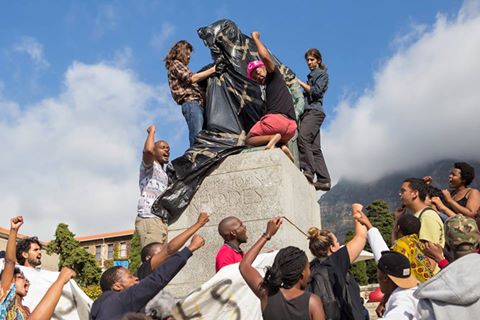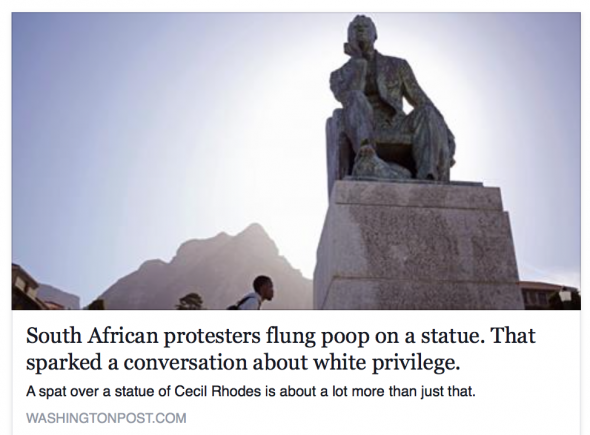
Removal of the Rhodes Statue. Reflection and Realisation
As protests calling for the removal of the Cecil John Rhodes statue at the University of Cape Town (UCT) make headlines around the world, Capetonian Alastair During – who has walked past that statue many times as a UCT student – shares his reactions and realisations about the protest. A Statue by Any Other Name…by Ali During When […]

As protests calling for the removal of the Cecil John Rhodes statue at the University of Cape Town (UCT) make headlines around the world, Capetonian Alastair During – who has walked past that statue many times as a UCT student – shares his reactions and realisations about the protest.

A Statue by Any Other Name…by Ali During
When the news filtered through to me that Chumani Maxwele had defaced the Cecil John Rhodes statue at UCT with faeces, I had two reactions. The first was disgust (which in hindsight I am ashamed of), and the second (interestingly) was to feel threatened. I will elaborate on both.
Although I am technically a white middle/upper class male, I like to think of myself as empathetic to the black community. I was raised in a liberal household, and was encouraged by my parents from an early age to actively ‘give back’ to the disadvantaged community.
At school, South African history was my favourite subject. I feel strongly about transformation in South Africa and support the quota system UCT has used for student enrolment, even though it meant that some of my friends were turned away.
However, my statement here is that I am ashamed to have considered myself ‘empathetic’ when I realise that my initial reaction to the statue debacle was disgust. I can honestly say that for all the times I have walked past that statue, I have never looked up at Cecil John Rhodes and been disgusted. In fact, I have felt the opposite, even going so far as to be grateful for all that Rhodes donated to the City of Cape Town and UCT.
But how can I consider myself ‘empathetic’ if I have never really stopped to dwell on all the harm that Rhodes and the colonialist era did to African civilisation? Rhodes and his era can almost be entirely credited with initialising the apartheid regime, way back in 1898 with the Glen Gray Act which imposed “a system of individual (rather than communal) land tenure, and created a labour tax to force Xhosa men into employment on commercial farms or in industry”.
I had a discussion with a former (black) SRC member last week where my opinion was that removing the Rhodes statue served little purpose and was an act that sought to erase and forget our history. I argued that just like you don’t pick your parents, you don’t pick your history and all aspects of it should be respected, as the lessons you learn from the mistakes others have made are as important as appreciating the things done right in our history.
While I still stand by that, I now support the removal of the statue as I realise (with shock at my own naivety) how insulting it must be to a black man or woman to see a glorified reminder of that era on a daily basis.
My second, and more emotional, reaction was that of feeling threatened. I felt threatened because to me, the defacing of the Rhodes statue felt like a violent attack on white South African history as a whole.
While I understand that this was not the intention, and that the focus was on promoting transformation, this particular protest bore the statement “exhibit white @ arrogance U.C.T”. This, I feel, was not a well thought-out statement. If the intention was to promote transformation and remove a symbol of colonialism, the statement should have said as much, rather than make the mistake of using a broad simple term “white arrogance”.
I urge those involved in the reform process to think carefully about the words chosen, as well as the public relations with white students of UCT. Understand that it is important to draw all UCT students to the struggle, as we are a community and should fight side by side. Be careful not to segregate the community. I did not choose to be born white, I am not on UCT’s transformation board, and if I could I would reverse South Africa’s colonialist/apartheid history for the better.
In hindsight I am hugely appreciative of the discussion and energy that Maxwele’s actions brought to both the UCT campus and the general South African population. This protest has brought to our (my) attention how desperately important it is as a South African population to constantly reassess our standard of reformation, and a warning that we cannot ever feel ‘comfortable’ with the progress made so far.
We must never stop refreshing our opinions and moving forward as a country.

Yesterday (Thursday 19 March) UCT’s Vice Chancellor Max Price announced the statue should be moved, not destroyed. While it awaits its fate, the statue has been covered with black rubbish bin bags. Meanwhile the protest now has a “UCT: Rhodes Must Fall” facebook page (as well as an opposing page) and Oxford students have stood in solidarity with the #RhodesMustFall movement, calling on ‘decolinisation’ of education. Students at Rhodes University have also joined the movement calling for, amongst other things, a transformation of the racial composition of academic staff and the changing of the university’s name.
